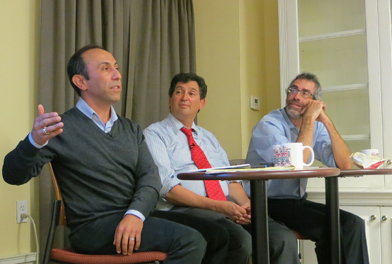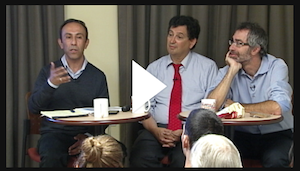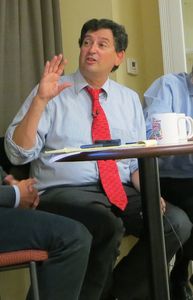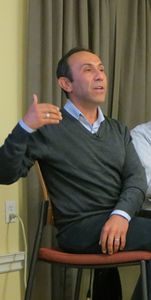Panel Speaks on Energy Efficiency in Urban Housing at Pardee Seminar

The Frederick S. Pardee Center for the Study of the Longer-Range Future at Boston University held the first Pardee House Seminar of the academic year, “The Future of Urban Housing: Enhancing Energy Efficiency,” on September 17 with approximately 40 BU students, faculty, and other guests in attendance.
Panelists included BU professors Robert K. Kaufmann (Earth & Environment) and Michael Gevelber (Mechanical Engineering), and Pardee Research Fellow Enrique Silva (Lincoln Institute of Land Policy), who served as moderator. Silva, Kaufmann, and Gevelber work together on the Madison Park Housing Energy Efficiency research project, a collaborative of the BU Sustainable Neighborhoods Lab and the Madison Park Development Corporation. The Pardee Center serves as the administrative home of this effort.

Silva provided an overview of the project, which began two years ago in partnership with Madison Park, a development corporation located in the Roxbury neighborhood of Boston that manages a wide portfolio of urban housing units. The project aimed at improving energy efficiency in a 4-building, 400-unit complex and to reduce its $1 million annual energy costs.
Silva noted that increased energy efficiency would not only reduce costs but would also have the beneficial environmental effect of lowering greenhouse gas emissions. Over the past two years, the researchers have focused on developing a baseline understanding of energy consumption and efficiency in Madison Park. Silva said developing this understanding has included both the monitoring of energy equipment and systems as well as interviews with residents and observations of their habits related to energy use. “These insights could not have come about” without the interdisciplinary approach and the direct involvement of the residents, Silva said.
 Prof. Kaufmann, whose role in the project focused on econometrics and statistics, looked at details such as square footage of apartments, weather data, age and number of residents, etc. and how those factors appear to relate to energy consumption. He also compared energy use between a building where the residents pay for utilities and one where the residents do not, finding that the price of electricity did not appear to be a factor in the amount of energy people used. He concluded that people want to be comfortable in their homes and will pay to do so. He suggested a possible way of motivating people to minimize their energy consumption would be to offer incentives. He referenced a study in the UK where researchers posted the amount of energy used in a building and created a contest for residents to reduce that number. The study saw a 14% reduction in energy consumption.
Prof. Kaufmann, whose role in the project focused on econometrics and statistics, looked at details such as square footage of apartments, weather data, age and number of residents, etc. and how those factors appear to relate to energy consumption. He also compared energy use between a building where the residents pay for utilities and one where the residents do not, finding that the price of electricity did not appear to be a factor in the amount of energy people used. He concluded that people want to be comfortable in their homes and will pay to do so. He suggested a possible way of motivating people to minimize their energy consumption would be to offer incentives. He referenced a study in the UK where researchers posted the amount of energy used in a building and created a contest for residents to reduce that number. The study saw a 14% reduction in energy consumption.
 Prof. Gevelber presented the engineering aspect of the project. His work involved determining what appliances residents are using that consume the most energy in each building. His team also monitored temperatures in apartments, which showed that residents were keeping their apartments very hot whether it was 20 degrees outside or 50 degrees. The apartments were either heated centrally (which is cheaper and releases less greenhouse gas emissions) or through space heaters (which are more expensive and use more energy than central heat).
Prof. Gevelber presented the engineering aspect of the project. His work involved determining what appliances residents are using that consume the most energy in each building. His team also monitored temperatures in apartments, which showed that residents were keeping their apartments very hot whether it was 20 degrees outside or 50 degrees. The apartments were either heated centrally (which is cheaper and releases less greenhouse gas emissions) or through space heaters (which are more expensive and use more energy than central heat).
The next step of this work is to determine what the best solution is to keep residents comfortable, as it seemed that they were most comfortable in their apartments when they kept the temperatures high. Prof. Gevelber suggested a way of reducing energy consumption is to have the buildings keep central heat on longer into the spring and earlier in the fall to reduce the use of space heaters.
 Silva’s work involved conducting in-person surveys and open-ended interviews with residents to better understand their attitudes and practices toward energy use. One piece of information gathered through the surveys was that many residents are senior citizens who rarely leave home and prefer to keep their apartments at high temperatures, also shown through Prof. Gevelber’s research. Silva also noted their studies found that residents have regular contact and generally good relationships with building mangers, and they could be trained to educate residents about energy efficiency and consumption. The next step is to present their findings in ways that will be useful to other affordable housing complex managers, emphasizing the need for comprehensive, interdisciplinary studies to gain a true understanding of energy use patterns and opportunities for improved efficiencies.
Silva’s work involved conducting in-person surveys and open-ended interviews with residents to better understand their attitudes and practices toward energy use. One piece of information gathered through the surveys was that many residents are senior citizens who rarely leave home and prefer to keep their apartments at high temperatures, also shown through Prof. Gevelber’s research. Silva also noted their studies found that residents have regular contact and generally good relationships with building mangers, and they could be trained to educate residents about energy efficiency and consumption. The next step is to present their findings in ways that will be useful to other affordable housing complex managers, emphasizing the need for comprehensive, interdisciplinary studies to gain a true understanding of energy use patterns and opportunities for improved efficiencies.
A video of the event is available on the multimedia section of our website.